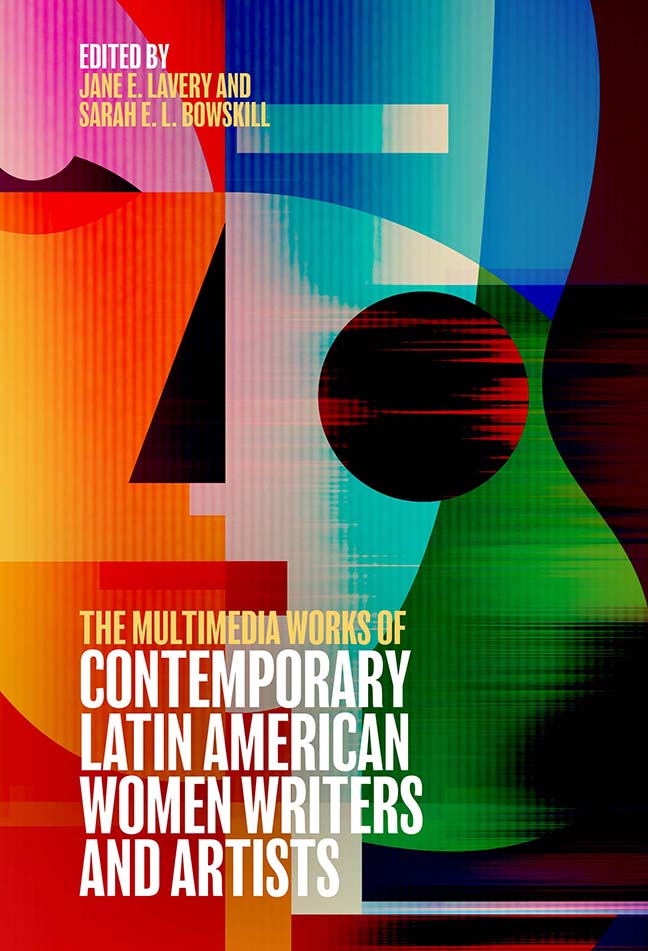Book contents
- Frontmatter
- Contents
- List of Illustrations
- List of Contributors
- Acknowledgments
- Introduction: A Crosscurrent of Contemporary Latin American Women Multimedia Writers and Artists
- 1 The Transliterary: The Novel and Other Multimedia Horizons Beyond (and Close to) the Textual
- 2 Commentary on Fe/males: Sieges of the Post Human (Transmedia Installation)
- 3 An Anthropophagic Ch’ixi Poetics
- 4 My Relationship with Artistic Creation Began with Words
- 5 Imagetext
- 6 Voices/Bodies
- 7 Redefining Meaning: The Interweaving of the Visual and Poetic
- 8 The Territory Is Home
- 9 Reflections on a Multimedia Practice
- 10 Digital Weaving
- 11 Eli Neira, Regina José Galindo, and Ana Clavel: “Polluting” Corporealities and Intermedial/Transliterary Crossings
- 12 The Digital Condition: Subjectivity and Aesthetics in “Fe/males” by Eugenia Prado Bassi
- 13 The Transmedia, Post-Medium, Postnational, and Nomadic Projects of Pilar Acevedo, Rocío Cerón, and Mónica Nepote
- 14 The Art of the Hack: Poets Carla Faesler and Mónica Nepote and Booktuber Fátima Orozco
- 15 The Places of Pain: Intermedial Mode and Meaning in Via Corporis by Pura López Colomé and Geografía del dolor by Mónica González
- 16 Words, Memory, and Space in Intermedial Works by Gabriela Golder and Mariela Yeregui
- 17 Fungibility and the Intermedial Poem: Ana María Uribe, Belén Gache, and Karen Villeda
- 18 Hypertext and Biculturality in Two Autobiographical Hypermedia Works by Latina Artists Lucia Grossberger Morales and Jacalyn Lopez Garcia
- 19 Dialogues Across Media: The Creation of (New?) Hybrid Genres by Belén Gache and Marina Zerbarini
- Bibliography
- Index
- Tamesis
15 - The Places of Pain: Intermedial Mode and Meaning in Via Corporis by Pura López Colomé and Geografía del dolor by Mónica González
Published online by Cambridge University Press: 17 December 2023
- Frontmatter
- Contents
- List of Illustrations
- List of Contributors
- Acknowledgments
- Introduction: A Crosscurrent of Contemporary Latin American Women Multimedia Writers and Artists
- 1 The Transliterary: The Novel and Other Multimedia Horizons Beyond (and Close to) the Textual
- 2 Commentary on Fe/males: Sieges of the Post Human (Transmedia Installation)
- 3 An Anthropophagic Ch’ixi Poetics
- 4 My Relationship with Artistic Creation Began with Words
- 5 Imagetext
- 6 Voices/Bodies
- 7 Redefining Meaning: The Interweaving of the Visual and Poetic
- 8 The Territory Is Home
- 9 Reflections on a Multimedia Practice
- 10 Digital Weaving
- 11 Eli Neira, Regina José Galindo, and Ana Clavel: “Polluting” Corporealities and Intermedial/Transliterary Crossings
- 12 The Digital Condition: Subjectivity and Aesthetics in “Fe/males” by Eugenia Prado Bassi
- 13 The Transmedia, Post-Medium, Postnational, and Nomadic Projects of Pilar Acevedo, Rocío Cerón, and Mónica Nepote
- 14 The Art of the Hack: Poets Carla Faesler and Mónica Nepote and Booktuber Fátima Orozco
- 15 The Places of Pain: Intermedial Mode and Meaning in Via Corporis by Pura López Colomé and Geografía del dolor by Mónica González
- 16 Words, Memory, and Space in Intermedial Works by Gabriela Golder and Mariela Yeregui
- 17 Fungibility and the Intermedial Poem: Ana María Uribe, Belén Gache, and Karen Villeda
- 18 Hypertext and Biculturality in Two Autobiographical Hypermedia Works by Latina Artists Lucia Grossberger Morales and Jacalyn Lopez Garcia
- 19 Dialogues Across Media: The Creation of (New?) Hybrid Genres by Belén Gache and Marina Zerbarini
- Bibliography
- Index
- Tamesis
Summary
In his illuminating study, The Work of the Dead, Thomas Laqueur reminds us that the dead come in and out of cultural focus. In the works scrutinized in this chapter, the dead are very much in focus, indeed in close-up, as I place the works of two very distinct artistic practitioners from Mexico into dialogue: the poet, Pura López Colomé and the photographer (primarily photojournalist), Mónica González. López Colomé is an acclaimed poet, essayist, and translator, most notably of the Irish Nobel Laureate, Seamus Heaney. Her collection of poems, Via Corporis (2016), is a collaborative project with Mexican visual artist, Guillermo Arreola. Based on a series of discarded radiographs from patients, the project transforms and translates this “dead file” into a series of paintings accompanied by poems that excavate the stories of illness, pain, and death behind the abandoned images. In this way, the two forms are enclosed in the same space and form an example of “explicit” intermedial production whereby, “more than one media are present synchronously or within one object” (Bowskill and Lavery 14). In some ways this impulse to write to these dead, and to write about this “dead file”, is a way to rebuff the notion, first expressed by Diogenes but widely sustained in cultural narratives in contemporary Mexico, that the dead do not matter. Through this eloquent paean to their existence, the poet (López Colomé) and the painter (Arreola) together reconstruct these bodies into a community of memory that simultaneously honors them at the same time as it mourns the collective pain occasioned by the explosion in the number of violent deaths in Mexico since 2006. This allegorical impulse is voiced explicitly by the poet when she says, “the reality in Mexico is so horrific, it is inescapable. What we are living at the moment in Mexico is so extreme that it is inside me; it is inside my poems. When I talk about the body's pain, I am also talking about the pain inflicted on the country's body” (Finnegan). Mónica González's award-winning multimedia project, Geografía del dolor (The Geography of Pain) (2011) sees González step beyond her photojournalistic role to engage with a multiplicity of media that co-exist within the one narrative arc: traditional postcard writing, music, photography, interactive web tools, and documentary film in order to narrate the stories of fourteen families affected by “desaparición forzada” (“forced disappearance”) in Mexico since 2007.
- Type
- Chapter
- Information
- Publisher: Boydell & BrewerPrint publication year: 2023



